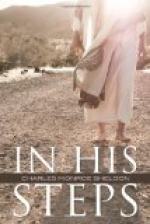Yet he walked home thoughtfully, and on his way he could not avoid the question of the continual problem thrust upon his notice by the saloon. How much had been done for the Rectangle after all? Even counting Virginia’s and Rachel’s work and Mr. Gray’s, where had it actually counted in any visible quantity? Of course, he said to himself, the redemptive work begun and carried on by the Holy Spirit in His wonderful displays of power in the First Church and in the tent meetings had had its effect upon the life of Raymond. But as he walked past saloon after saloon and noted the crowds going in and coming out of them, as he saw the wretched dens, as many as ever apparently, as he caught the brutality and squalor and open misery and degradation on countless faces of men and women and children, he sickened at the sight. He found himself asking how much cleansing could a million dollars poured into this cesspool accomplish? Was not the living source of nearly all the human misery they sought to relieve untouched as long as the saloons did their deadly but legitimate work? What could even such unselfish Christian discipleship as Virginia’s and Rachel’s do to lessen the stream of vice and crime so long as the great spring of vice and crime flowed as deep and strong as ever? Was it not a practical waste of beautiful lives for these young women to throw themselves into this earthly hell, when for every soul rescued by their sacrifice the saloon made two more that needed rescue?
He could not escape the question. It was the same that Virginia had put to Rachel in her statement that, in her opinion, nothing really permanent would ever be done until the saloon was taken out of the Rectangle. Henry Maxwell went back to his parish work that afternoon with added convictions on the license business.
But if the saloon was a factor in the problem of the life of Raymond, no less was the First Church and its little company of disciples who had pledged to do as Jesus would do. Henry Maxwell, standing at the very centre of the movement, was not in a position to judge of its power as some one from the outside might have done. But Raymond itself felt the touch in very many ways, not knowing all the reasons for the change.
The winter was gone and the year was ended, the year which Henry Maxwell had fixed as the time during which the pledge should be kept to do as Jesus would do. Sunday, the anniversary of that one a year ago, was in many ways the most remarkable day that the First Church ever knew. It was more important than the disciples in the First Church realized. The year had made history so fast and so serious that the people were not yet able to grasp its significance. And the day itself which marked the completion of a whole year of such discipleship was characterized by such revelations and confessions that the immediate actors in the events themselves could not understand the value of what had been done, or the relation of their trial to the rest of the churches and cities of the country.




